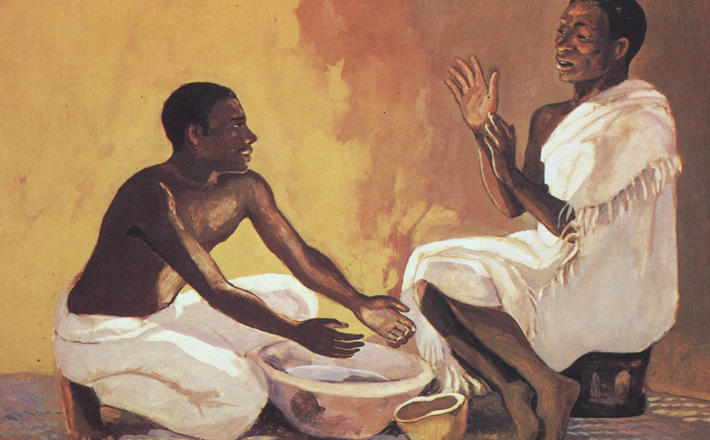Commentary on John 13:1-17
John’s Gospel has been leading to chapter 13 and beyond. John 12:50 is the end of Jesus’ public ministry. As the scenes turn, there are now three narrative aims: 1) Jesus’ farewell and preparation of his followers for his death, 2) Jesus’ betrayal, trial, and sentence to the cross, and 3) Jesus’ crucifixion, resurrection, and appearance to his followers. Jesus has come to earth for one reason, to give up his life, to die to save his people. The “hour” is approaching.
Interestingly, chapters 1-12 cover three years of Jesus’ life and ministry. He and his followers have been to Jerusalem twice (2:13, 5:1). From chapter 13 forward, there is a third trip to Jerusalem and events that cover 24 hours. This illustrates how everything in John’s portrayal of Jesus has been leading to this, the hour of his passion.
13:1-18 may be mistakenly viewed as a parallel to the Synoptic Gospel accounts of the “last supper” Jesus shared with the twelve on Passover before his arrest (Matthew 26:17 and following, Mark 14:12 and following, Luke 22:7 and following). It is important not to conflate this story with those.
First, this account does not report a Passover event. It is before Passover (most scholars think the day before Passover). Second, there is no institution of the Eucharist—no words over the bread that is shared and no indication that a cup is passed. Finally, the central feature of the story is foot washing, not a meal. This account needs a different interpretation from that of the Synoptic Last Supper narrative.
The foot washing as an Ancient Near Eastern rite of hospitality is not an unexpected thing to encounter in a scene such as this. In fact, foot washing was customary. John’s portrayal is not typical, though, because of several factors:
- The person of lower status should wash the feet of the higher-status guest. Jesus flips this.
- The foot washing should happen as guests arrive. As the guests are already at the table, another routine is disrupted.
- This should be a simple and unobtrusive act. Jesus’ washes feet at the table and converses during and after about the act.
Jesus’ washing of the disciples’1 feet is unconventional. Verse one explains in two ways: Jesus knew his departure from the world was imminent and he loved his disciples. Jesus is not following a formula or an etiquette book. Jesus is acting in love, performing what we might today call, team building. Jesus is taking care of his disciples before he leaves them.
Jesus takes off his outer garment, tucks a towel into his shorts, and grabs a basin of water. (The same word for “takes off” is the Greek for the “giving up” of his life—the astute Greek reader would see the foreshadowing.) One-by-one he washes each person’s feet.
The devil has already co-opted Judas Iscariot from the group, but this does not mean Jesus did not wash Judas’ feet. The glitch in the normal progression is when Jesus gets to Peter.
Peter flinches: “No, you will not wash my feet.” Interestingly, Peter is the only one reluctant to participate. The pattern Jesus is establishing is a complete breach of the honor codes of the day, and Peter’s objection is understandable. Jesus’ response is harsh: “If I do not wash your feet, you will not have any part with me.” If Peter does not participate in this group-binding experience, Peter cannot have any position among Jesus’ followers.
This is a decision point for Peter and a foreshadowing for the careful reader. Peter decides to go all in: “Give me a full bath; wash every bit of me.” The foreshadowing is that we know there is a coming decision when Peter will hesitate again. Peter is only all in for the moment.
Jesus dresses and sits at the table and acknowledges that he has broken protocol. He has done so as an example for them to follow. He tells them that their blessing, their honor, will come from duplicating his example of service in equality. So much for status and protocol.
There are two adaptable ideas in this text. The first is akin to Peter’s initial reaction. There is something too intimate, too vulnerable, too uncomfortable in the story. Jesus really did demote himself to the role of a servant and wash the feet of his followers to show them something about power and weakness.
What do you mean? Me, ask for help? Me, diminish myself? Me, submit? Here in the second week of Lent, many may be bumping into this wall. Some Christians follow the Lenten discipline of submission by “giving up,” for these weeks before Easter. Letting go of will and control is complicated.
The second suggestion is that foot-washing should continue as a rite. “You also ought to wash one another’s feet” (verse 14). Some traditions maintain the practice, and many who do incorporate it on Maundy Thursday. This is seen as an example of service and humility in community to one another. There is clear evidence Christians have practiced foot-washing as a rite over many centuries as an act of humble service.
A current Lenten discipline is to take on additional service, either in Church or community. This means adding something to one’s spiritual practices and is an alternative to giving something up or submitting to some spiritual rigor. Taking on such service may stretch the limits of individuals during Lent. Service fatigue has its own difficulties, aside from the issue of whether this rite really is meant to be part of the Church’s ritual schedule.
Notes
- We should note that just because the word “disciples” occurs, we should not limit our thinking to “The Twelve” in this or any other of the contexts in John where disciples are referenced. In fact, John never presents a list of 12 disciples. Followers of Jesus are included as disciples whether they are among the 12 or not in this Gospel.
PRAYER OF THE DAY
Holy Lord God,
Jesus washed the disciples’ feet as a sign of service and compassion. Show us how to live and love in service and with compassion, for the sake of all your children. Amen.
HYMNS
Jesus, priceless treasure ELW 775, UMH 532, NCH 480
God, whose giving knows no ending ELW 678, NCH 565
Lord, whose love in humble service ELW 712
CHORAL
Amazing grace, John Bertalot


March 13, 2022